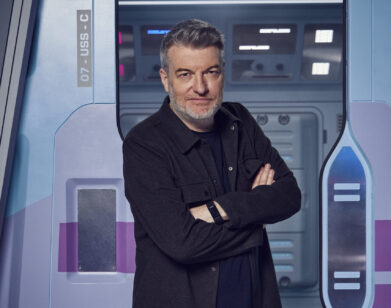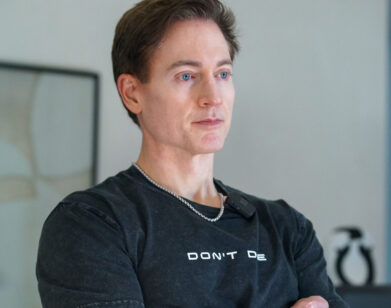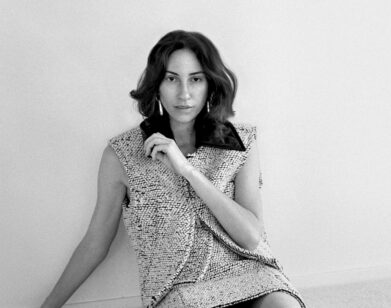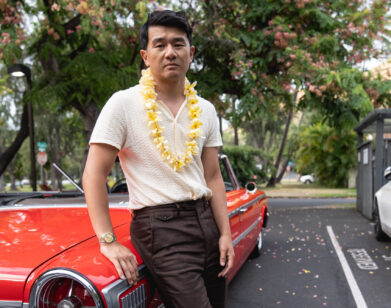IN CONVERSATION
Taylor Kitsch and Josh Brolin on Shamans, Sweat Lodges, and Self-Transformation

Suit by Todd Snyder. Taylor Kitsch, photographed by Luca Bertea.
First, Taylor Kitsch moved to Montana. Then came a New Year’s Eve spent with a shaman, and now, a television show at the top of Netflix’s charts. But let’s rewind a bit. For the past two years, the Friday Night Lights alum has been getting into character. He lost 25 pounds, tracked wolves, and visited the Wind River Reservation in Wyoming, all of which helped him embody the role of Isaac Reed, a Shoshone-raised white man whose contested past seeps through the cracks of history in the gritty Netflix Western American Primeval, set during the 1857 Utah War. “Some of the best work of my life is on the floor of this, and I think that’s what I struggle with,” Kitsch told longtime friend Josh Brolin, who was on set for the making of the limited series. “You were such a fucking champion for me, man.” After the show’s release, Kitsch called Brolin for moral support, again. This time, they talked about sweat lodges, shamans, and giving yourself over to a role.—EMMA STOUT
———
JOSH BROLIN: Tell me about your sickness and then we’ll work our way up from there.
TAYLOR KITSCH: So New Year’s Eve, I had this Native sweat lodge planned and I was hosting three of my good buddies. Jake Picking came in.
BROLIN: Really? That’s great. He seems so open to doing anything and everything.
KITSCH: His first Native sweat, and he needed it, too. I think everyone did. I had terrible back pain and these crazy headaches, but I rebounded long enough to be able to drive to the sweat lodge. Then I got home and it absolutely nailed me.
BROLIN: Do you think it was like whatever toxin living inside you and the sweat brought it all out?
KITSCH: I think so. There’s some energy I wanted to get out, obviously. But the shaman was like, “We don’t really have to read into this one. Whatever’s happening right now, it’s—”
BROLIN: It’s coming out.
KITSCH: Yeah.
BROLIN: That energy… I assume I know what it is. And that’s the idea of doing this limited series.
KITSCH: Yeah, you were there for some of it. It’s been a tough one, man.
BROLIN: Tell me why.
KITSCH: Because I cared so much. Not that that’s a problem, but it’s hard to let go. You have these ideals—you’re serving the Shoshone community— and you put in all that work. But it did really help me, understanding that it was my journey and it wasn’t. I put a little more responsibility on other people to service the same thing. That released a lot of tension because I’ve been torn up by it.
BROLIN: It’s a very different subject. You and I did Only the Brave together, which meant a lot to me because I was a volunteer firefighter. I took that script to my chief, who’s a firefighter in Tucson, Arizona, and I asked him, like you would a shaman, “Do you think I can do this?” And he said, “I think you’re the only person who can do this.” But the point is, I cared so much about it that I needed somebody who I respected in the nucleus of that world to tell me that I could represent it well. And nobody saw that movie, by the way. That’s one of those things where you go, “I still served and cared and gave myself 1000%.”
KITSCH: You really did.
BROLIN: That’s all you can do. I saw the first two episodes and it blew me the fuck away, which I’ll get into. You care, though. That’s the point. You’re purging now because you care so much. You seem to be one of the most empathetic people that I know, way more than me.
KITSCH: I don’t know.
BROLIN: Well, I give a shit about the role and the story and morale on set. But I think you take it super fucking personally, especially representing Native Americans. I had a whole relationship in my 20s with a shaman in Tucson that I was spending a lot of time with. I was doing sweats all the time—
KITSCH: Amazing.
BROLIN: It was amazing. Now, seeing you go through that, you seem like the most unapologetically vulnerable person that I know. When I hear about you tracking wolves in Montana, it makes sense to me. I go, “Yeah, it’s Kitsch. Fucking out there, doing his thing with a camera.” You want to get as close to the experience as you can, and that’s who I know you to be.
KITSCH: Man, when they asked for this interview, I was like, “There’s only one person we can truly ask.” Obviously, you helped me a lot during the shoot and being there. But to represent this process, which was quite intense, it makes you go down that road again. You were such a fucking champion for me, man. I remember I was feeling pretty shitty, and you knocked on the door. I was like, “Who the fuck?” And it was you and the girls waiting to come in and hang out. How are they doing?
BROLIN: They’re amazing. They’re bigger personalities than I am. They’ve taken over the world.
KITSCH: That’s a big feat, but damn.
BROLIN: Yeah, I know it was a tough time for you. You lost a ton of weight for the role. It felt like, “I don’t want this to be just another role. I want this to mean something.” I just wrote a book, and it’s a very unconventional book.
KITSCH: Fucking right. I remember you reading a passage on the patio.
BROLIN: If you’re spoon-feeding people what they’re looking for, you can sell a lot of books. But if you write like I do, or act like you do, you’re picking roles for reasons that are very personal. You want to bleed. You want to earn it. I know it’s a rarity, but without that, what do you have? So when I see you in that place, there’s a part of me that’s happy because it’s like, “This tortured motherfucker, he’s fucking downward spiraling. But thank god you exist.” Tell me what the experience was like for you, because I watched it and I thought you were great. And I’m pissed that I can’t see more yet. It’s chaotic, it’s visceral, it’s violent, it’s hard to watch.
KITSCH: I think it should be all those. Man, it was a fucking roller coaster. The Shoshone and learning a lot of that—
BROLIN: Learning the language.
KITSCH: Yeah, it changed my perspective a lot. Working with the advisors and the dialect coaches, getting an opportunity to do something so raw in a period where most fights ended hand to hand, I loved it. There’s no karate chopping, no spinning wheel kicks.
BROLIN: That fight that you have with that guy is fucking amazing. You’re like, “Oh my god, somebody must have gotten hurt.” And you don’t get that a lot when you watch those movies.
KITSCH: No. I mean, when the Native jumps off that cliff, it’s so practical to just roll cameras. We padded—not literal pads—but just put more snow and cleared out the rocks in the little passage towards the river. He was like, “Make your way over to that riverbed.”
BROLIN: And that’s it?
KITSCH: Yeah. I mean, that guy was huge too. He probably had 80 pounds on me. Big boy.
BROLIN: You had lost how much weight?
KITSCH: 25 [lbs]. I just wanted Isaac to outwill you. He wasn’t the biggest guy. He kind of wanted to die, but had to honorably go. So that’s why he fought the way he fought. It was more of his will than just his strength or knowing how to really fight. That was fun. Betty Gilpin is incredible, and Shea Whigham.
BROLIN: Shea is great. And who’s the main girl? I don’t know her very well, but I thought she was great.
KITSCH: Yeah, Betty Gilpin. A gamer who’s just uninhibited and really prepared.
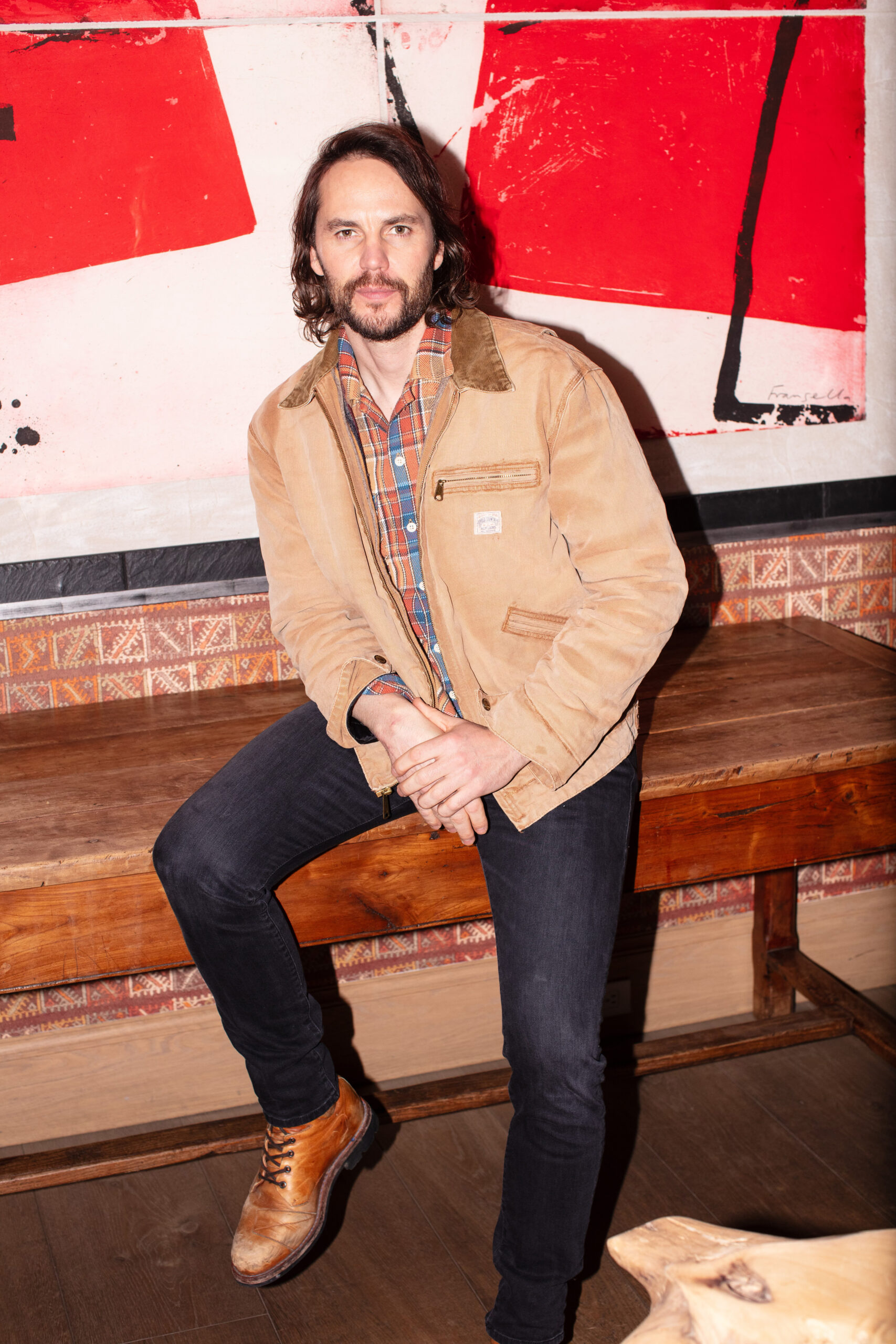
BROLIN: Are you happy the way it turned out?
KITSCH: I mean—
BROLIN: Have you watched the whole thing?
KITSCH: Yeah.
BROLIN: You’re still in it, man. If you said you were happy the way it turned out, I would be suspect. There’s only one movie I’ve ever done that I’m happy it turned up.
KITSCH: Oh my god, really?
BROLIN: Yeah. And that was No Country [For Old Men]. I thought it was going to be a joke.
KITSCH: You know No Country is top three for me.
BROLIN: I didn’t know that. But I want to take this in another direction because I don’t know if people know what you do. You live in Montana, and you haven’t lived in Los Angeles for a long time. Why?
KITSCH: I think it’s a little self-preservation. Knowing yourself well enough to know what you need. A lot of it actually goes back to what raised me, the things I know, with the ranch and everything. I was riding my moto through Yellowstone and I was like, “Oh, I love this place.” Next year, we put it on the trip again. I’m like, “Oh, man, Bozeman’s a fucking cool town.” Then all of a sudden you’re in Austin, Texas, in your dream home and you feel like you should be there now. You just answer to it.
BROLIN: That’s where you’re different—most people don’t answer to it. Most people go, “God, I went to Bozeman. That was really cool. I’d like to live there someday, but I’ll just keep doing what I’m doing because it’s comfortable.” Going back to the stoics, it’s like, “Comfort is your enemy.” You get complacent, you get lazy, and you start worrying about what the size of your trailer is.
KITSCH: Truly.
BROLIN: How do you represent humanity if you’re doing that? Because that’s not humanity.
KITSCH: Especially with [American] Primeval, I met a guy who lost everything. His dad passed when I was playing a guy in mourning, which was kind of fucking crazy. But while I was prepping, it meant more. I was like, “This is all they had.” Family was their education, their language, their heritage.
BROLIN: And there’s no decision to even use that.
KITSCH: Right. I didn’t need to. I had done all the work. I tell you, some of the best work of my life is on the floor of this, and I think that’s what I struggle with. But to that point I made earlier, just because the world won’t see it doesn’t mean you didn’t serve it. I think I told you this, but I cried more in that one scene than I did when I lost my fucking dad—
BROLIN: Yeah, you did.
KITSCH: The energy of the Shoshone and what they’ve gone through, I felt like they were with me. It was really a beautiful thing. But, I don’t know, I go back and forth. When you’re prepping, you see it in your head. You see the arc, and you see these moments. Of course, there’s going to be some beautiful ones that are unexpected. But when you feel your service didn’t go towards something, it feels like, “I just gave up two years of my life, got this fucking bone cut out of my foot, did all this crazy shit”—
BROLIN: And you go, “For what?” But there’s no version of this, I think, that ever would’ve gone, “Fuck, I’m psyched how it turned out. It’s perfect.” It just doesn’t work like that. I used to do this thing where people would say, “Hey, I saw you in this.” And I would just shit on their reaction. After 40 years, I don’t do that anymore. My business is to do what I do and care about it and give myself to it entirely. When it’s over, I’ve got to deal with my own demons. You don’t know how people are going to be affected by it. I was affected. My wife, by the way, saw it with me, and she was super into it.
KITSCH: Betty, she’s the audience.
BROLIN: What movies have you seen that you’ve liked lately?
KITSCH: Fuck, I’ve been watching a lot of these true-crime docs. It’s so hard not to get so invested in those. I just watched the Jude Law one with the white supremacist. He’s terrific in it.
BROLIN: Really?
KITSCH: I like to see him just unabashedly fucking gritty. The Order, it’s called.
BROLIN: I was way behind on movies, and I saw a movie called Sing Sing last night.
KITSCH: I know that movie.
BROLIN: It takes place at Sing Sing, which is one of the oldest prisons in the United States, and it’s based on this guy who was in prison for robbery for 17 years. He started a theater community in the prison, so he wrote it. He plays a supporting part, and I met him on Jimmy Kimmel. I was bawling.
KITSCH: No shit. So why are you in London?
BROLIN: I left my family. I am just tired of it. I just want to be alone. You know what I’m saying?
KITSCH: You’re just in a white-out hotel room in London.
BROLIN: It was funny because I came in here to get my key and the guy goes, “Can I tell you something? The room you’re in is Ridley Scott’s favorite room.” I go, “I don’t care, it’s my favorite room.” It was such a funny thing to impart. But I’m filming Running Man with Edgar Wright.
KITSCH: Fucking yeah.
BROLIN: It’s fun. I like him. He’s weird, and I like weird.
KITSCH: Unreal, man. Congrats. You’re there for a while then, huh?
BROLIN: I’m here for three weeks, and then I’m out.
KITSCH: I love it. They’re shooting you out.
BROLIN: They’re shooting me out, and I get back home.
KITSCH: You deserve that, by the way. Fucking right.

BROLIN: I got to get back to my motorcycles and my children. My children were going to be here and then at the last moment I was like, “For real I’m going to be working the whole time. It’s super cold right now. You’re going to be walking in the rain looking at parks and shit.”
KITSCH: Darkness. Are these sets just insane?
BROLIN: Insane. And I was just here doing Knives Out with Rian Johnson.
KITSCH: I met him a couple times now and I hear he’s fucking awesome.
BROLIN: He’s literally my new favorite person. The most unassuming guy who has total control over his set. He sits there smoking a cigar every morning. And I go, “Why don’t you wait until night?” He says, “I don’t know, I just like them in the morning.” He’s completely his own self. But yeah, I’ve been working in London a lot, and I like it here. I love the culture, and I love fucking with the people. It’s all good.
KITSCH: That Imperial War Museum is one of the best things I’ve ever done. It’s just incredible there.
BROLIN: Yeah, it’s really something. I love you, pal.
KITSCH: Love you, man. Thanks for doing this.
BROLIN: I think you did fucking phenomenal. You continue to be amazing, and you’re one of those people that gives themselves entirely. You’ll be all scraped up and scarred up by the time you get to the end of your life, and I’ll be there laughing.
KITSCH: That means a lot.

